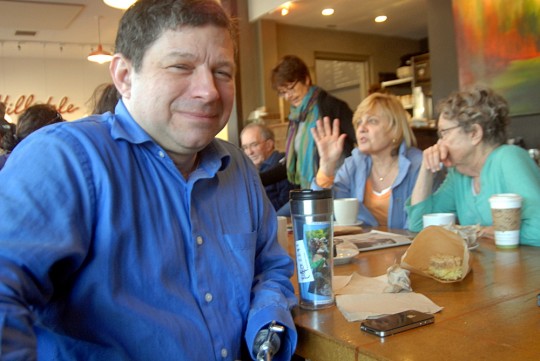
(Photo: M.Andersen/BikePortland)
When Portland’s transportation commissioner arrived in town, he was almost a caricature of a newcomer to the Northwest.
As a young East Coast professional in 1990, he came through the city for business and fell for its walkable downtown and its affordable urban setting. A lifelong tenant with no desire to buy a house or even know his neighbors, the former federal environmental lawyer moved into a home next to a Southeast Portland bar and started getting into local politics.
It was 20 years later that three things tugged him to Southwest Portland’s Multnomah neighborhood. They might sound familiar to many recovering east-siders.
He fell in love.
He got a dog.
And he was on a budget.
To cap our Southwest Portland week, we met one of its most famous residents: the city’s top transportation official. Commissioner Novick met us Friday morning at the Baker & Spice bakery in Hillsdale to get away from policymaking and talk about the things that matter to him as a Portlander and a person: how he gets around, where he hangs out, how he makes decisions and how he’s somehow become the sort of person who regularly goes to his neighbors’ house for dinner.
You grew up outside Eugene. What brought you here to Portland?
I was working in Washington D.C. and we actually sued the Port of Portland. I came out because of that and looked around downtown and said, wow, this is a really nice city. That was in 1990.
What was it that set the city apart then?
The downtown. It was the fact that there was a lively downtown, which at that point was really rare in the United States.
And you lived in the Sellwoodish area for a while after moving here, right?
I was right next to the Skybox pub. Sometimes the phone lines would get crossed and I would get calls to the Skybox.
Why’d you choose there?
I just needed somewhere to live.
And what brought you to the west side?
Well, first I moved in with [his now-wife] Rachel, to almost the same place, from Sellwood to Westmoreland. I never would have thought about buying a house, but she wanted a dog. I thought that would be OK. We were very eastside people, and we looked around various eastside places and it was incredibly expensive.
I’ve always assumed that the west side is still more expensive than the east side. Someone told us we should look in Hillsdale or Multnomah Village. I was like, that’s not possible, the west side is really nice! One of those days, I moved the cursor from one of those real-estate websites across the river just to see. And one of the first properties I saw was actually the place we live now. It’s actually almost as expensive because the taxes are higher, because of Measure 50. But I’d much rather pay my money to the city and the county and the schools than to the bank.
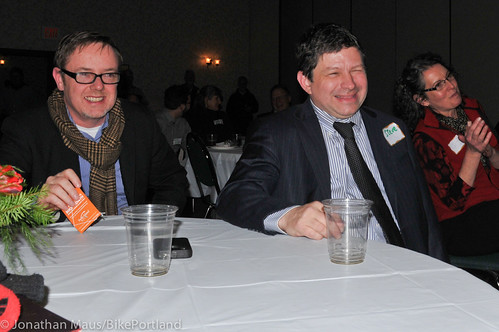
(Photo: J. Maus/BikePortland)
How often do you usually drive and how often do you take the bus?
Usually I’ll ride with Rachel. She drives, drops me off and then goes to the county, which is where she works. Sometimes I take the bus a couple of times a week in, and sometimes I take it back.
Are you the only council member who regularly gets to work without a car?
I don’t know. No, Nick [Fish] does now! He gave up his car. I mean, they still have a car but it’s not a two-car household. I think he rides his bike some, too.
What are your hangouts?
This is one of them – to be honest, I like Starbucks coffee better. We love the fact that there’s actually a video store here. I love Annie Bloom’s. I love just hanging out in the Village. We have breakfast at Fat City at least once a month. And occasionally, I confess, we do go to a movie theater in Tigard.
How is being a politician different than being an advocate?
As an advocate, you get to pick and choose what decisions to make. As a politician you have to make choices all the time about things that you didn’t initially have opinions about. And you have to vote! So inevitably you disappoint a lot more people than as an advocate.
Advertisement
Do you have a system, like a decision tree or something, for how to make policy judgments?
Not really.
So how do you figure out what to do?
There are some things where you know where you’re going to be no matter what. I have a fantastic staff, and they’re really good at summarizing things for me. Sometimes I will just tell them to make a decision. You’re much better informed than me, so you decide. It’s a judgment call, and I trust their judgment.
If it’s my bureau, I try to talk to as many people as possible. Like with the Foster road diet. It struck me as probably a good thing, but I wanted to make sure that we consulted with lots of people who would be affected.
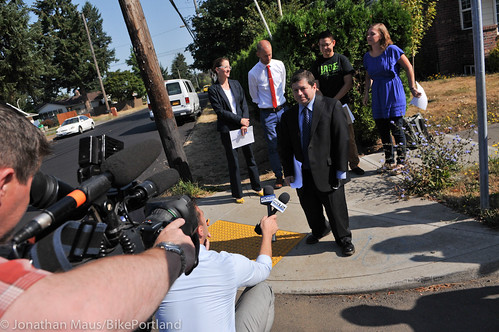
(Photo: J. Maus/BikePortland)
Have you ever been involved in a neighborhood association?
Oh, no. (Laughs.)
What’s your thinking about the neighborhood association system?
I think it probably works differently depending on where you are. There’s a larger number of people involved in some areas than others. There’s probably more representative groups in some areas than others. Not everybody is going to show up at a neighborhood association meeting.
We had an interesting discussion last week. We were talking about the West Quadrant plan, which sets the height limit of the buildings in Goose Hollow. The Goose Hollow Neighborhood Association said they wanted a lower limit. Then the previous Goose Hollow board came up and said the opposite. The new board said yes, these people are tools of the developers and we have ousted them in an election!
I finally asked how many people voted in that election. They said about 80. I asked how what the population of Goose Hollow was.
And they said, “80’s a lot! Usually it’s like 20!” I said, I’m sure that’s true.
Sometimes I think that neighborhood associations make outreach easy, but they also make it too easy to check the “outreach” box.
Well, 99 neighborhood associations are a lot, so it’s not that easy. What you have to do is talk to the neighborhood associations and then talk to other people too.
Do you plan to stay in your current neighborhood for a long time?
Oh, yes. We have really great neighbors. I’ve never been in a place before where I knew my neighbors at all. We didn’t know this when we moved in, but our house had been part of a progressive dinner that went from house to house.
Wow.
…which started 50 years ago! We live in Mayberry.
What changes would you like to see in Multnomah Village? Or maybe you’d rather not see changes?
I think it’s fantastic the way it is. There’s a new pizza place going in that we’re looking forward to. It would be ideal if there was a Zebra or something going in there – having a little grocery store would be nice.
I doubt their level of density is going to change all that much. It’s easy for me to say, but I wouldn’t mind more people being able to take advantage of the Village, if there were more multifamily housing around.
If you wind up on the council for a few cycles, which other bureaus are you interested in?
All the bureaus are interesting. I have exactly the bureaus I want.
I wanted to have either fire or 911 because health-care cost is such a big deal, and those are part of the larger health-care system. [Novick runs the emergency response bureau as well as PBOT.] And transportation: I asked the mayor, look, transportation, it’s critical to people’s daily lives. It’s critical to health care costs and climate disruption. And fortunately, the things we can do to improve people’s health are the same things that we can do to prevent climate disruption.
I also had a sense that because Portland is seen as a leader in transportation, it would have lots of people who knew about it. And that is obvious here. It kind of reminds me of when I worked for the Justice Department. The quality of people in the EPA regional offices varied widely. Frankly, the most talented people in Dallas want to work for an oil company, whereas in Seattle the most talented people want to work for the environment.
You talk about health care as one of your reasons for being interested in transportation, too.
It’s a financial issue. We spend 18, 19 percent of our GDP on health care, compared to 11 percent for other industialized countries. We spend 2 perent of GDP on infrastructure, compared to 5 percent in Europe and 9 or 10 percent in China. If you could take 7 percent of GDP and move it from health care to infrastructure, to education, to other things, you could have a much healthier country.
It’s sort of a cliché in local government now that local government is more functional than the federal government. And I look at the federal government and I’m just in complete despair, while in local government people are still, you know, sharing ideas with each other. You wanted to be in the Senate. Did you dodge a bullet by not getting into this Congress?
In some ways yes, but it’s going to take federal action to solve the problems. But yeah, right now it’s impossible.
Two encouraging things I’ve seen in the last few weeks, both in the New York Times. First, a majority of Republicans think we should do something about climate change. It may not be the activist Republicans, but it’s something. Also, a really solid majority of Hispanics think climate change is really problematic. Those are actually two of the best things I’ve seen in the last two years.
Qs & As edited.
-Well folks, that pretty much wraps up our SW Portland Week. But wait! We’ve still got full cameras and notebooks. Yes, time has run out on the week, but we’ll never stop covering SW Portland. Stay tuned next week, and the week after that, and the week after that, for more of our perspectives — and yours — on this fantastic part of our city.
Correction 2/17: Due to a transcription error, a previous version of this article misquoted Novick on the amount of GDP spent on infrastructure in Europe.

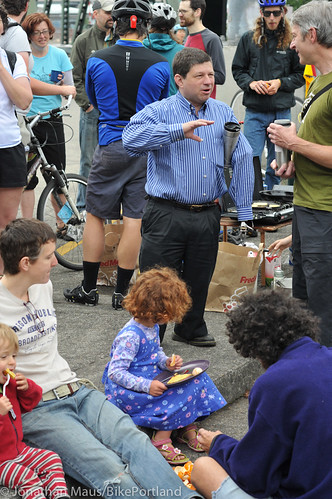
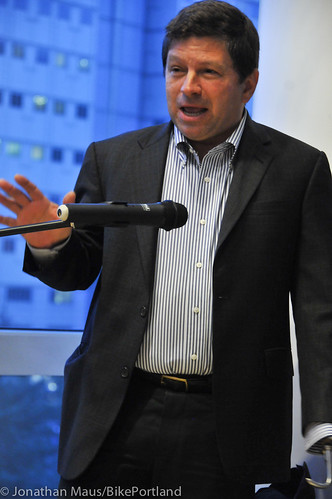
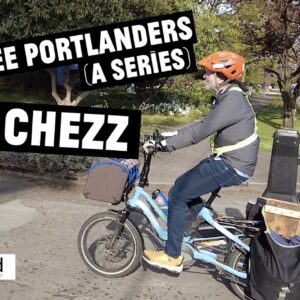



“Do you have a system, like a decision tree or something, for how to make policy judgments?
Not really.”
“I have a fantastic staff, and they’re really good at summarizing things for me. Sometimes I will just tell them to make a decision.”
Are one or both of you guys saying that this is unusual? I’m pretty sure the only unusual thing about both of those is that politicians don’t usually say them out loud.
I’m certainly not Steve Novick, and I’m sure the job he has is a tough one, and I suppose it is a cheap shot for me to criticize him or his approach to policy, but that answer of his struck a nerve. Ever since the day he first ran for city council, the first thing out of everyone’s mouth has been how smart he is, what a brilliant guy. Perhaps that was not his fault either. But when it came to initiatives, the one I noticed right away was the Street Fee. If that circus is a fair impression of Novick’s approach to policy matters, I’ll say that having a system, a plan, a strategy for how to go about something like this seemed then and still seems like a really good idea. I am disappointed in his answer to that question and refuse to concede that this is the thinking we should expect from our elected officials.
Besides, it was a great question.
Candor is great. But I’ll take principle + strategy over that any day.
Smart people delegate minor tasks and decisions so they can focus on more important decisions. Unless you have some evidence of a lack of work ethic, I see no problem with his statement.
My criticism wasn’t of his predisposition to delegate (that was Caesar), but the apparent absence of a system for making policy judgments.
Staff researches and summarize the issue: fine.
Staff makes the decision: wrong.
Whether or not it is a common thing that elected public officials do is irrelevant to whether or not it is the right thing to do.
A decision to go with his staff’s best thinking (staff he hired) is him making a decision. He is the one that actually votes at City Council. I think it is a good thing for elected officials to bring more people into their personal decision making process.
It’s a slippery slope though with non-elected people making decisions that we (well not me with Novick) elect specific people to make.
Why all the neighborhood Assoc. questions (and kind of negative tone)? We live in a city that has an outdated “at large” form of government, how else would we try to get representation from different areas?
That approach can cut both ways. When representation is broken into regions the interests of elected officials can stagnate. While I agree that our system sometimes disappointing I feel in the long run it allows for large city wide interests to be represented.
How when a large portion of the city (possibly even the majority) are not represented, because almost all councilors have been from inner, largely affluent neighborhoods?
I would much rather have a councilor every term FROM East Portland, who is going to constantly push for their interests, than just have a random councilor here or there who kind of is interested in it.
Super reports this week! I live here, ride all over SW, and still learned a lot from your articles. As far as I’m concerned, featuring different areas of the city should be done as often as you have the time and energy for it. Bravo!!!
My folks moved to PDX in 1948 when I was two years old; they bought the house I grew up on SW Hume Street (sight unseen!) in Multnomah.
The youngest of four, I attended Multnomah School, class of 1960…right across the street from Lucky Lab; then Wilson High School, class of ‘64.
My mother was a librarian for Multnomah county, ending her career as Branch Librarian at the Hillsdale branch.
My father was professor at Lewis & Clark college, 1948 to 1978 (as well as a Presbyterian minister and great fly fisherman!)
Hume Street west of 35th, was and remains today unpaved to 37th. We played on it, learned to bike on it, and dumped gravel in the pot holes from time to time.
Traffic was slow, but once in a while someone would go too fast…and lose a license plate or muffler, or something. Our dog, Sox, hung out in the potholes waiting for cars to chase.
As I recall there was once a discussion of an LID to pave it, as was done on SW 37th. My late mother pointed out that it would mean the loss of our big maple tree out front, more drainage into our already wet basement, and faster traffic; it never happened. Compare funky old Hume Street to suburban 37th between Hume and Multnomah Blvd. Unpaved 36th was a thru walking route to Multnomah (Village), but at the corner of Hume also served as our ball field as the property owner there landscaped it with lawn, but never objected to our using it. Mom pointed out once that it was, after all, a public right of way!
What we had in those days in Multnomah was a community, a fabric woven, in part, of overlapping acquaintances. My teachers knew my folks…our dad had been PTA president for a year or so. I started delivering newspapers in the 3rd grade, subbing for my older brother, so I delivered the afternoon paper to my first grade teacher, Mrs. Newton, who knew my mother as she was librarian at a tiny little branch on “main street” of Multnomah. Later I took over my brother’s morning route, and between us we had it for nine years! Did my Mom ever hear about it at the library, then in Hillsdale, when I went off to college! The overlaps just went on and on…work, sports, school, commerce, etc.
The area was also very economically diverse. I delivered papers to some pretty run down corners, trailer parks, etc. as well as some pretty tony ones. Lots of nationalities, but, with the exception of a extended Native American family on upper Tryon Creek, all Euro-American.
And the so-called village was a real commercial center with EVERYTIHING! (except a good bookstore!) Two pharmacies, three small grocery stores, bank, hardware store, two bakeries, men’s store, Ed’s Camera and Hobby shop (he lived on our paper route), Copeland Lumber, dentists, doctors, bars (The Ship and Rener’s are all that’s left of the old town). Probably the same could be said for many old commercial districts in the City. When Washington Square opened, it was the final nail in the coffin as some local businesses tried to relocate there and died while others just stayed in place and died. My Mom refused to go to Wash Sq; never went! By the late 70’s its was almost all antique stores, except for Annie Bloom’s Books!
I think this is something we are trying to get back to with the “20 minute neighborhood,” and I know that spontaneous real life encounters with friends and acquaintances is one of the joys of life!
Maybe I am just an old dog sounding like Philip Roth on Newark, NJ!
PS I got out of there as soon as I could at 17! Too much of a good thing?
Thanks for the great reporting on my old stomping grounds!
I think it’s true that people may be stepping away from displacement by suburban mall, of small town character and function. From your recollection of Multnomah Village’s earlier days, I can realize that it was once a far more robust, diverse and functional town than it is today.
Walking isn’t bad, if there’s some place nice to walk to and walk within, and nice foot routes to get there. It’s definitely worth spending some money to restore, in this respect, some of that which has been lost. Malls have the flash and dazzle which is fun on occasion. The small town is community that many people may be coming to realize again, is something beneficial to have on a day to day basis.
Coffee: doesn’t necessarily have to be the ‘bucks, but some French Roast in the blend is a definite ‘yes’.
…ARE one of the joys of life!
“to be honest, I like Starbucks coffee better”
political suicide!
This article is nothing more than endorsement of a political figure.
Interestingly there wasn’t a single question that specifically was about bikes or biking in the SW.
Fair criticism, but this wasn’t a policy interview. It was a profile. We’ll continue to talk with him and his office about policy, including bike policy, at other times. In the meanwhile, it’s inherently valuable to understand the personal perspective of the guy who’s making transportation policy decisions. That’s what we were after here; I actually omitted a bit of transportation policy talk, or moved it to the post about Barbur. (If you’re curious: basically he agrees with almost everybody in the city that Barbur and Capitol Highway need better biking and walking.)
I hope you’d agree that this blog doesn’t have a shortage of transportation policy coverage. This was a break from that, as our Friday Profiles always are.
Sure but every other SW profile heavily involved bikes, or why else would you be interviewing them.
But you shouldn’t be surprised then that you’re going to take criticism of this being just a kind of puff piece about a political figure.
“…(If you’re curious: basically he agrees with almost everybody in the city that Barbur and Capitol Highway need better biking and walking.) …” andersen/bikeportland
I’m curious whether Steve has ever walked, or stood along either of those roads, for more than a few minutes, particularly Barbur.
And if so, from his impression of that experience, what his thoughts are about whether Barbur, considering the amount of motor vehicle use and consequential pollution arising from it that is present there, could ever really be a healthy place to walk and bike, even if the road had separated bike lanes, or continuous bike lanes across the bridges.
The Village needs more bike lanes.
NOBODY LIKES STARBUCKS BETTER IF THEY REALLY LIKE COFFEE.
Maybe he likes burned coffee?
It’s worth noting that this former practicing attorney is talking about housing affordability on a six figure personal salary. $110k, if I recall.
What’s the median household income in Portland’?
$40,142 according to google.
I’m going to guess that’s less than it would take to buy a house in almost anywhere in SW Portland.
softball questions & answers with a guy who enjoys tweeking PDX residents and has yet to grow up.
No wonder Novick’s office ignored my neighborhood’s letter on the Street Fee for 4 months! I guess his staff already had it figured out?
I received a response to my letter. Took about 10 days and was basically a “we’ll do what we want to do” response. Novick and Hales both knew they’re out of work next year if it was approved on a Council vote.
Uh, I don’t think they really seemed to care if they were out of work, didn’t read the defiant “they can vote us out” comments from last year?
From: Novick, Steve
Sent: Thursday, September 19, 2013 1:38 PM
To: Hales, Charlie
Subject: Pieces of eight! Pieces of eight!
Captain Hales – This is my National Talk Like A Pirate Day message to you:
Avast, Cap’n! Word on deck is that you have uncovered between $8 and $11 million pieces of eight that were hidden in the hold. As you have always been square with us, I trust that a fair share will go to all, including especially shipmate Merlo so she can buy provisions to better prepare for the next Nor’Easter.
Aaaarrrggghhhh!
Left Hook Novick
Fourth Mate
http://www.oregonlive.com/portland/index.ssf/2013/09/portland_commissioner_steve_no_1.html
http://catapultingpropaganda.blogspot.com/2007_09_01_archive.html
¿Since when does growing up require losing a sense of humor?